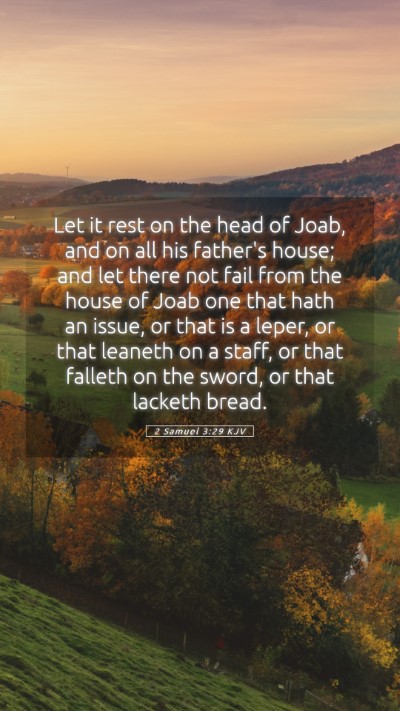Understanding 2 Samuel 3:29: A Comprehensive Bible Verse Commentary
The verse 2 Samuel 3:29 reads: "Let it rest on the head of Joab, and on all his father’s house; and let there not fail from the house of Joab one that hath an issue, or that is a leper, or that leaneth on a staff, or that falleth on the sword, or that lacketh bread." This verse is a poignant reflection on the consequences of betrayal, the nature of God's judgment, and the complexities of human relationships. Below is an exploration of its meaning, interpretations, and implications.
Principal Themes in 2 Samuel 3:29
- Divine Judgment: The verse expresses a sense of divine justice. It reflects the belief that certain actions, particularly those involving betrayal or violence, will have repercussions that extend beyond the immediate context.
- The Legacy of Sin: The curse mentioned in the verse underscores the concept that the sins of one generation can affect the next, a theme prevalent in Biblical texts.
- Human Suffering: The various afflictions listed (issues, leprosy, etc.) symbolize the inevitable hardships faced in life, suggesting a connection between sin and suffering.
Commentary Insights
Matthew Henry's Commentary
Matthew Henry highlights that Joab's actions—killing Abner—were not merely political but deeply rooted in personal vendetta. In this context, the curse upon Joab's house serves as both a warning and a prophetic declaration regarding the divisions within Israel and the personal consequences of Joab’s brutality.
Albert Barnes' Notes
Barnes emphasizes the cumulative guilt of Joab as he reflects on the social and spiritual ramifications of such violence. He notes that the phrase "let it rest on the head of Joab" signifies that Joab must bear the full weight of his actions, highlighting a key component of Biblical justice—individual accountability.
Adam Clarke's Commentary
Clarke provides a linguistic and cultural analysis of the terms used in the curse, noting that different afflictions symbolize various failures in life, reminding readers of the comprehensive nature of divine retribution. He reflects on the seriousness of the curse and its implications for future generations of Joab’s lineage.
Applying the Verse to Modern Life
This verse can be applied to contemporary life in several significant ways:
- Understanding Accountability: Just as Joab faced the consequences of his actions, modern readers are reminded of the importance of accountability in their own lives.
- Coping with Legacy: The idea that one's actions can affect future generations encourages individuals to consider the long-term impact of their decisions.
- Dealing with Difficult Relationships: The themes of betrayal and retribution prompt reflection on interpersonal dynamics and the need for reconciliation.
Bible Study Insights
For those seeking further understanding through Bible study resources, consider the following:
- Historical Context: Investigating the political landscape of Israel during David's reign can provide depth to this passage.
- Character Studies: Studying the lives of Joab, David, and Abner can yield insights into human nature and divine justice.
- Cross References:
- 1 Samuel 24:6 - David's restraint from killing Saul shows the contrasting principles of mercy and vengeance.
- Proverbs 26:27 - The concept of being ensnared by one's own actions resonates with the consequences faced by Joab.
- Galatians 6:7 - "A man reaps what he sows" relates directly to the underlying message of accountability in 2 Samuel 3:29.
Conclusion
In summary, 2 Samuel 3:29 serves as a powerful reminder of the Biblical themes of justice, legacy, and the human condition. Understanding this verse requires a multi-faceted approach, combining historical context with personal application.
Further Study and Exploration
To deepen your understanding, consider participating in Bible study groups or utilizing online Bible study tools. Engaging with others allows for shared insights and communal growth in understanding, along with exploring Bible study guides that offer structured lessons on Old Testament narratives.


